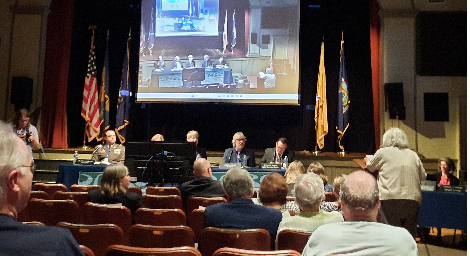Unanswered Questions About The Economic Impact of Gas Drilling In the Marcellus Shale:
March 27, 2010Broad Scope of EPA’s Fracturing Study Raises Ire of Gas Industry
April 9, 2010By Jon Hurdle, Thu Mar 25, 2010 10:37pm EDT
(Reuters) – Philadelphia officials asked a state regulator on Thursday to ban the natural-gas drilling technique known as hydraulic fracturing until its environmental effects, especially on drinking water, are studied.
The City Council urged the Delaware River Basin Commission to deny a drilling permit to Stone Energy Corp (SGY.N), a Louisiana-based oil and gas company, or to any other company that wants to use the technique to extract gas in the watershed that supplies the city’s drinking water.
Stone Energy began operations in a protected area of the river basin without the necessary approvals, and now has applied for permits to drill for gas, extracting water it needs from a tributary of the river, the council said.
“We call on the Delaware River Basin Commission to halt Stone Energy’s operations, and not approve their application, or any other applications, until a full environmental impact assessment of fracking in the Delaware River Basin has been conducted,” the council said in a unanimous resolution.
A spokesman for Stone Energy, Tim O’Leary, said fracking posed no threat to water supplies.
“Stone Energy believes that hydraulic fracturing technologies are a safe and proven method of accessing ample domestic sources of clean natural gas needed by the United States,” O’Leary said.
He said the company complied with all local, state and federal regulations governing gas development.
The commission, consisting of representatives from Delaware, New Jersey, New York and Pennsylvania, plus federal officials, is charged with protecting the river over about 330 miles from its headwaters to the Delaware Bay.
Concern about possible ground water contamination from hydraulic fracturing, or “fracking,” has led New York City to call on state authorities to prevent drilling in the city watershed. U.S. Congress members have introduced a bill that would require energy companies to disclose chemicals they use in fracking.
The U.S. Environmental Protection Agency, which has expressed “serious reservations” about the prospect of fracking in the New York City watershed, said on March 18 it will conduct a national study of the process.
Critics of the technique say gas drilling in the Delaware River basin threatens the drinking water of 15 million people, 2 million in the Philadelphia region.
“I knew the responsible thing to do was to send a strong message that drilling should not occur without an environmental impact statement,” said Philadelphia City Councilwoman Blondell Reynolds Brown, who sponsored the resolution.
Energy companies exploiting vast reserves of shale gas in Pennsylvania and other states say there has never been a proven case of water contamination from fracking, and that the toxic chemicals are injected through layers of steel and concrete thousands of feet below drinking-water aquifers.
The Delaware River Basin Commission did not immediately return phone calls seeking comment.



